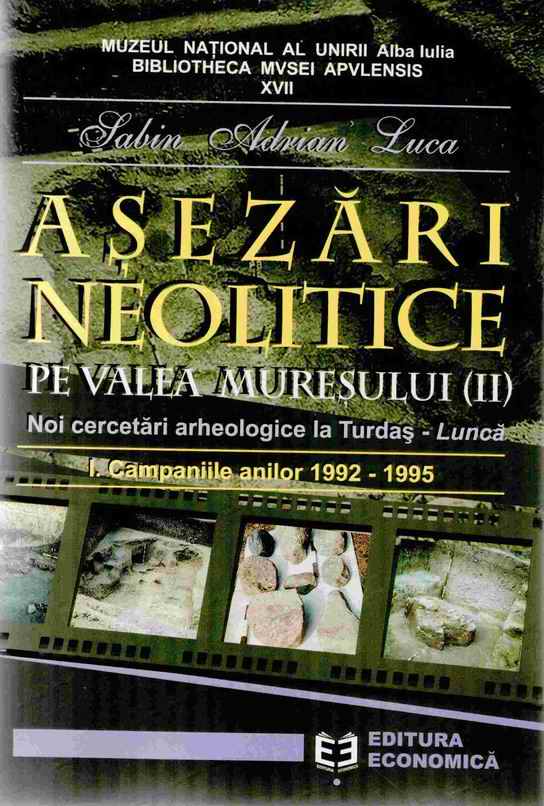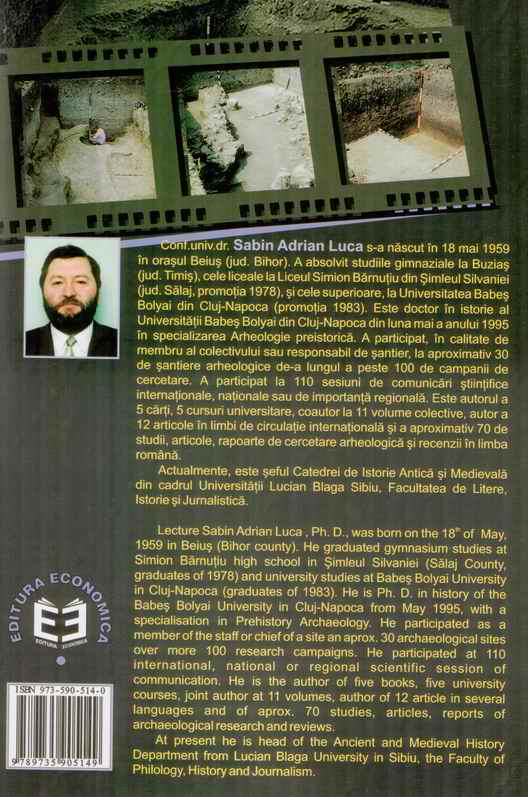AŞEZĂRI
NEOLITICE PE VALEA MUREŞULUI (II)
Noi
cercetări la Turdaş – Luncă
I.
Campaniile anilor 1992-1995
English Title: NEOLITHIC SETTLEMENTS IN THE VALLEY OF THE MUREŞ (II) NEW ARCHAEOLOGICAL
RESEARSCH AT TURDAŞ–LUNCĂ, I. THE 1992–1995 CAMPAINGS. Autor: Sabin Adrian LUCA, BIBLIOTHECA MVSEI APVLENSIS XVII, ISBN 973-590-514, Editura Economică, 2001 © copyright: Sabin Adrian
Luca Prelucrare Web: Cosmin Suciu; Powered by: Institutul
pentru Cercetarea Patrimoniului Cultural Transilvanean în Context European (IPTCE) Coperta 1 / Coperta 2Introduction The systematical research of the
Turdaş–Luncă
archaeological site proved to be a challenge for each generation of
archaeologists from the 20th century. From different reasons, the
most important being the believe that the site has been entirely destroyed by
the river Mureş, the most complex research remain those from 1875 of
Zsófia von Torma and their checking made by Marton Roska in 1910. Since then,
the most insistent trial for research is being done by our team, excavations
starting in 1992, being interrupted between 1999–2000, and continuing with
the year 2001. The results that were obtained
fulfill the researcher’s expectations. The discovered artefacts allow a
correct dimension into periods – chronological and cultural – of the dwelling
levels, and the stratigraphic observations allowing us to realise a
stratigraphy compared with other sites from Ardeal, but also from other
region of the country. The unusual large amount of
information compelled us to structure the book into two parts (the 1992–1995
campaign – volume 1 and the 1996–1998 campaign – volume 2), the first part
being presented now to the archaeologist reader. The first book comes to the
complete the information published in the volume regarding the Turdaş settlements
from Orăştie–Dealul Pemilor,
point X2 (LUCA 1997b) or Valea Nandrului–La Dos (LUCA–ROMAN 1999). Of course that after the publishing of other
Turdaş settlements we may try a syntesis regarding the Turdaş
culture, as this culture is not definitive in a satisfactory way at present
time. This volume could not have been
finished without the help of many students from Sibiu and Alba Iulia who
spent their holidays in the camp – tends from Turdaş and have resisted
to the sun in the valley of Mureş. Many of these students are now our
colleagues, prove that this school – site has reached it’s purpose. I thank my colleagues – especially
to lecturer Zeno–Karl Pinter, Ph.D. – for their disinterested and welcomed
help, to lecturer Horia Ciugudean, Ph. D. for hosting these lines in the
prestigious collection from Alba Iulia and to the rector of the “Lucian
Blaga” University Sibiu, professor HD
Dumitru Ciocoi Pop, Ph.D., for his help offered to establish the school –
site from Turdaş. I have to thank also to the director of the Museum of
Roman and Dacian Civilisation, in Deva, Mrs. Adriana Rusu–Pescaru, Ph.D., for
the logistic and moral support, and to researcher, professor Gheorghe
Lazarovici, Ph. D., Florin Draşovean, Ph.D., and, last but not least,
professor Mrs. Silvia Marinescu–Bâlcu, Ph. D., who honoured us with her
presence for almost on entire campaign of research on our site. I have to
thank our professor from the Cluj University, professor Pompiliu Teodor, Ph.
D., who honoured us with his presence during his holidays spent at
Turdaş. I thank my colegues at the “1 Decembrie” University in Alba
Iulia – professor Iuliu Paul, Ph. D., lecturer Ioan Andriţoiu, Ph. D.,
and lecturer Marius Ciută for their benevolent collaboration. There are also colleagues from
abroad I owe good thoughts and thanks. First of all, Mr. Horváth Ferenc, Ph.
D., from “Móra Ferenc” Museum in
Szeged, professor Bernhard Hänsel, Ph. D. (Berlin), professor Harald Haptmann,
Ph. D. (Heidelberg, in present in Istambul), professor Wolfram Schier
(Würtzburg) and to many others we have meet, either during gathering
reference material abroad, or at international congresses and symposiums. To all of them I shall remain
grateful ! Sibiu, at 1st february
2001 Sabin Adrian Luca, Ph. D. |

